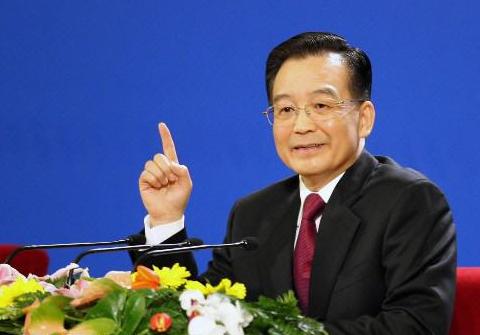 中国总理温家宝周日发出警示,家国经济正在遭受巨大的下行压力,他就此代表国家最高领导人就近期经济的急剧下滑表示出了明显的担忧。
中国总理温家宝周日发出警示,家国经济正在遭受巨大的下行压力,他就此代表国家最高领导人就近期经济的急剧下滑表示出了明显的担忧。
在一次中国中东部城市的周末视察中,温总理呼吁政府“采用更加积极的预设和微调政策”,运用财政和货币工具尽最大可能的抵消经济放缓的影响。然而面对民众,温总理采取了安抚稳定的策略,他尽力消除公众的疑虑与担忧,表示目前经济“总体运行速度稳定”,中国官方新闻机构新华社报道。
温总理分析经济放缓的主要原因是海外需求的疲软,尤其是受到欧洲摇摇欲坠经济发展的影响。然而在周六发表的单独言论中,温总理重申应通过禁止房地产投机进一步下调房地产价格,让更多人可以支付房款。
这项政策也是造成经济放缓的一个重要原因,因为除了用以补贴低收入人群的保障性住房以为,民用住房的建设几乎停滞。全国上下的房地产开发商因此削减了大批员工。
从东南沿岸气候潮湿的工业城市广东,到西北边陲的制造业与物流中心西安,到处的建筑工地都进行了上班制度的调整,从原来的一周七天,每天三班轮到,变成如今的一周五天,每天一班制。
房地产市场价格下降的程度所体现的数据大都不够准确。经纪人们说去年房地产市场价格下降了20%甚至更多。政府的每月调查针对一些少有房产买卖交易的老城区做了研究分析,发现那里的下降幅度要小很多。然而,另一项针对房地产开发商的单独调查显示,很少有开发商愿意承认如经纪人所说的急剧跌落状况。
中国央行周四宣布,本月第二次削减监管的银行贷款和存款利率,展现出一反常态的轻快步伐。这次削减很快燃起了中国公众对房地产投资购买的热情,近几周来数据也显示房屋交易量开始增加。
然而中央银行周四警告各银行继续严格控制抵押贷款,并且温总理周六再次强调,政府旨在加强人民购房能力的政策未曾动摇。“为了进一步贯彻这一宗旨,”新华社称,“温总理要求始终不渝的努力坚持实施房地产投机禁令,以求价格回落到合理水平,并且要阻止价格反弹,以维护之前的努力成果。”
非正式的统计表明,全国100个城市里有三分之一已经放宽了房地产投资的禁令,并在近几周着手重振本地房地产市场。温总理表示,这些放松禁令的行为必须立刻禁止并且采取逆转行动,并发话要严惩那些违规犯法的官员。
销售土地使用权对于当地政府来说是一笔很重要的收入,所以低迷的房地产市场已经开始影响到当地政府的收入。许多类似的当地政府已经深陷债务危机,因为他们在2009年和2010年斥巨资建设基础设施项目,如机场、高速公路和高速铁路,以抵消全球经济放缓带来的恶劣影响。
中国政府已经采取措施支持除房地产以外的其他领域的发展。除了降息,政府开始释放银行资金,允许放出占存款更大比例的贷款,补贴节能型家电的销售,并加速了大型建设项目的批准。
在此次视察访问期间,温总理暗示将采取进一步措施,包括抵免那些投资于研究和发展的公司的税收。他鼓励中国企业增加对于东南亚、中亚和南亚地区的出口生意,为工业化国家可能出现的保护主义压力提供备选措施。
尽管最近几周以来已经做出了大量的努力,然而预计于本周发布的、六月第二季度的经济数据可能仍将显示出进一步的经济疲软。四月和五月的数据显示出了反常的缓慢增长,主要表现在零售业,投资,电力消耗和其他方面的经济增长。
随着电力需求放缓,许多不必要的煤炭累积起来,以至于中国主要港口的煤炭储存区域都达到了创纪录的饱和水平,满载煤炭的运输船只到港后甚至需要等待好多天才有地方卸货。在中国北方的一些地区,成堆的开采煤矿占满了空地和路边,煤矿主们维持着生产,等待着煤价回升。
Premier Wen Jiabao of China warned on Sunday of “huge downward pressure” on the Chinese economy, in the clearest expression yet of concern at the top of the country’s leadership about a sharp slowdown in recent months.
During a weekend inspection tour of east-central China, Mr. Wen called for the government to “preset and fine-tune its policies in a more aggressive manner,” using fiscal and monetary tools to offset the economic slowdown as much as possible. But he also tried to reassure the public, saying the economy was “running at a generally stable pace,” said Xinhua, the official Chinese news agency.
Mr. Wen largely attributed the slowdown to weak demand from overseas, particularly Europe with its faltering economies. But in separate remarks on Saturday, he reaffirmed a government policy of making real estate prices more affordable by banning real estate speculation.
That policy has played a central role in China’s economic slowdown, as housing construction has slowed to a crawl except for subsidized housing for lower-income families. Developers across the country have laid off huge numbers of workers.
Construction sites from the steamy factory cities of Guangdong in the southeast to manufacturing and logistics hubs like Xi’an in the northwest have cut back this year from three shifts working around the clock, seven days a week, to one day shift on weekdays.
Scant accurate data is available on the extent of the decline in real estate prices. Brokers say prices have fallen 20 percent or more in the last year. A monthly government survey of older neighborhoods where few transactions take place shows a much smaller decline, however, while a separate survey of real estate developers shows that few acknowledge the steep discounting described by brokers.
The Chinese central bank announced on Thursday that it was cutting the country’s regulated bank lending and deposit rates for the second time in four weeks, an uncharacteristically brisk pace. The cuts have started to rekindle the Chinese public’s enthusiasm for real estate investments, with the number of transactions starting to quicken in recent weeks.
But the central bank warned banks on Thursday to keep a tight rein on mortgage lending, and Mr. Wen said on Saturday that the government’s policy of improving the affordability of real estate had not wavered. “To further implement the regulation,” Xinhua said, “Wen urged unswerving efforts to ensure prices return to reasonable levels, and block a price rebound that would undermine the effects of previous efforts.”
Informal tallies suggest that about a third of China’s 100 largest cities have loosened the ban on real estate speculation in recent weeks to revive local markets. Mr. Wen warned that these loosening moves must be halted and reversed, and even threatened punishment for officials who tried to “cheat” on the restrictions.
Sales of land leases are a critical source of revenue for local governments, so the downturn in real estate markets has hurt their finances. Many of these governments are deeply in debt after spending lavishly in 2009 and 2010 on infrastructure projects like airports, highways and high-speed rail to offset the effects of the global economic slowdown.
The Chinese government has already adopted policies to support the rest of the economy. In addition to the interest rate cuts, the government has freed banks to lend a larger share of their deposits, subsidized the sale of energy-saving home appliances and accelerated the approval of large construction projects.
During his inspection tour over the weekend, Mr. Wen hinted at further measures, including tax credits for companies that invest in research and development. He urged Chinese businesses to pursue export opportunities in Southeast Asia, Central Asia and South Asia as alternatives to industrialized countries where protectionist pressures might build.
Despite these efforts in recent weeks, economic data for June and for the second quarter, scheduled to be released this week, is expected to show further weakness. April and May data showed unusually slow growth in retail sales, investment, electricity consumption and other barometers of economic growth.
As electricity demand has slowed, so much unneeded coal has accumulated that storage areas at major Chinese ports are at record levels and arriving ships full of coal must wait many days to unload. Piles of mined coal fill empty lots and line roadsides in some mining areas in northern China, as mine owners maintain production while hoping prices will recover.
 中国总理温家宝周日发出警示,家国经济正在遭受巨大的下行压力,他就此代表国家最高领导人就近期经济的急剧下滑表示出了明显的担忧。
中国总理温家宝周日发出警示,家国经济正在遭受巨大的下行压力,他就此代表国家最高领导人就近期经济的急剧下滑表示出了明显的担忧。
